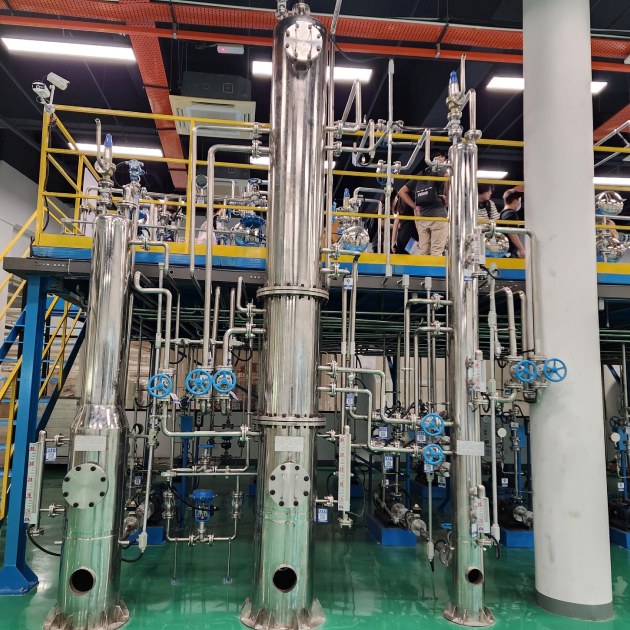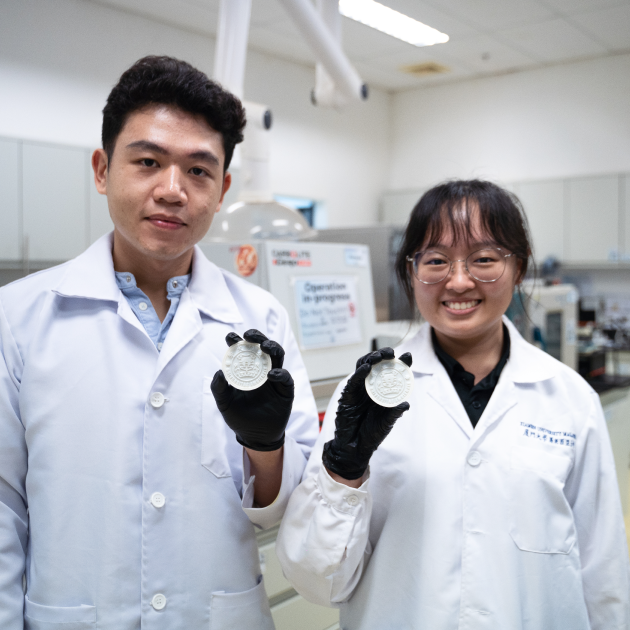
Exploring Chemical Engineering: Bridging Science and Industry
Chemical Engineering (ChE) is a well-recognised branch of engineering that applies the core scientific principles of chemistry, physics, biology and mathematics to transform raw materials into useful or valuable end-products. ChE covers the development, design and operation of chemical processing plants while considering elements such as techno-economic viability, operability, safety and sustainability for the extraction, conversion and recovery of materials. There is a tremendous demand for chemical engineers in many sectors of industry, including the traditional processing industries: chemicals, polymers, fuels, foods, pharmaceuticals, and paper, as well as other sectors such as electronic materials and devices, consumer products, mining and metals extraction, biomedical implants, power generation, education and insurance.
Leading the Way in Chemical Engineering Education
The ChE programme in Xiamen University Malaysia (XMUM) has been awarded accreditation by the Engineering Accreditation Council (EAC) Malaysia and provides a cohesive learning and knowledge-building environment for the pursuit of quality teaching and research. Other than the set-up of advanced chemical engineering laboratories for teaching purposes, a Simulation Integrated Process Plant (SIPP) was also established in XMUM. The SIPP facility can be regarded as the first simulated process plant available in Malaysia catering for the training of chemical engineering students especially in the fields of process safety, control and instrumentation. The elements of Industrial Revolution 4.0 (IR 4.0) are also embedded in some of the courses in the ChE programme. In addition, the programme is supported by well-qualified staff members who are experts in various research areas of chemical engineering, such as catalysis process, modelling and simulation, nanomaterials, membrane, biomass and bio-product development.

Ensuring Engineering Excellence: The Role of Board of Engineers Malaysia
The Board of Engineers Malaysia (BEM) is a federal statutory agency under the Ministry of Works Malaysia established under the Registration of Engineers Act 1967 (REA 1967). Amongst its primary roles are to register Graduate Engineer (GE), Engineering Technologist (ET), and Inspector of Works (IoW) and to regulate the professional conduct and practice of registered Persons to safeguard the safety, health, and interest of the public.
Find out more about the resources and activities available on BEM website as follows:
BEM Official Website
Mandatory Registration with the Board of Engineers Malaysia
BEM Mini Convention Presentation Material
BEM Webinar Presentation Material
BEM Official Youtube Channel

Programme Highlights
- A programme accredited by the Engineering Accreditation Council (EAC) Malaysia and recognised by the Washington Accord
- Courses designed to equip graduates with essential skills needed for Industrial Revolution 4.0
- A stimulating environment with excellent teaching and research lab facilities
- An opportunity for students to gain operating skills accessing Malaysia’s First Simulation Integrated Process Plant (SIPP)
- A wide range of students’ activities to help transform our students into highly skilled, well-rounded professionals
- Opportunities for research stays in the main campus
Duration
4 yearsIntakes
February/April/SeptemberMedium of Instruction
EnglishFees
RM28,000 per year (Malaysian); RM29,000 per year (International)LEARN MORE for miscellaneous fee of this programme
Brochure
View MoreThe PEOs are to produce graduates who: -
Demonstrate professionalism and social responsibility in the practice of chemical and allied engineering
Performance Indicators & Target:
- Registered with BEM (100% for Malaysian students)
- Members of the learned societies (25%)
- Participated in activities organized by learned societies or community service organizations (15%)
Display leaderships and assume technical or managerial positions of greater responsibility in multicultural working environment
Performance Indicators & Target:
- Working towards a Professional Engineer status (10%)
- Career advancement in the past 4 years (25% senior position)
Pursue continued lifelong learning through professional practice and further graduate education
Performance Indicators & Target:
- Engage in further studies (20%)
- Continuous professional development (30%)
At the end of the programme, graduates will be able to:
- Engineering Knowledge - Apply knowledge of mathematics, science and engineering fundamentals and chemical engineering specialisation to solve complex engineering problems.
- Problem Analysis - Identify, formulate, research literature, analyse, and reach substantiated conclusion for complex chemical engineering problems using first principles of mathematics, natural and engineering sciences.
- Design/Development of Solutions - Design solutions, systems, components or processes for complex chemical engineering problems that meet specified needs with appropriate consideration for public health and safety, cultural, societal and environmental considerations.
- Investigation - Conduct investigation by using appropriate research skills and methodologies which include literature review, experimental design, analysis and interpretations of results, and making sound conclusion for complex chemical engineering problems.
- Modern Tool Usage - Create, select, and apply appropriate IT tools to model and simulate complex engineering problems by having a full understanding of their limitations.
- The Engineer and Society - Apply reasoning informed by contextual knowledge to assess societal, health, legal, safety and cultural issues and consequent responsibilities relevant to professional engineering practice and solutions to complex chemical engineering problems..
- Environment and Sustainability - Understand the impact of professional solutions of complex chemical engineering problems in societal and environmental contexts and demonstrate knowledge of and need for sustainable development.
- Ethics - Apply ethical principles and commit to professional ethics and responsibilities and norms of engineering practice.
- Communication - Communicate effectively by demonstrating ability to comprehend, write and present, give and receive instructions clearly on complex engineering activities with the engineering community and society at large.
- Individual and Team Work - Function effectively as an individual, team member or leader in a multi-disciplinary environment.
- Lifelong Learning - Recognise the need for lifelong learning and be able to demonstrate the capacity to so on independently.
Project Management and Finance - Demonstrate knowledge and understanding of engineering management principles and apply these to one’s own work either as an individual, team member or leader in a multi-disciplinary environment.

The minimum credits for graduation will be 145 credits with all the parts meeting the minimum requirements of credit value in Table 1.
Table 1: Components of the Programme and its Value
Bachelor of Chemical Engineering with Honours | ||
|---|---|---|
Terminology Explanation:
Compulsory Courses - MPU: Mata Pelajaran Pengajian Umum (MPU) courses are recommended by the Ministry of Higher Education (MoHE) to cultivate an appreciation for the Philosophy, Values and History of Malaysia.
Major Core Courses: Courses designed to meet the core educational objectives. Each major core course has its own features.
Common Core Courses: Essential courses offered for students from different majors but in the same discipline.
Major Elective Courses: Courses designed to help students to identify their field of interest or direction within the major. This will enable them to be better prepared for their career pathways.
General Elective Courses: Courses designed to give students options outside their major-related courses. For example, students in the business field are encouraged to take courses in the Arts and Science fields to diversify their scope of knowledge.
Chemical engineer and researcher in:
- Oil and gas industry
- Palm oil industry
- Energy industry
- Chemical and allied products
- Healthcare/Pharmaceutical industry
- Food industry
- Biochemical/Bioenergy industry
- Water technology
- Material science
- Health, safety and environment engineering
- Electronics companies
- R&D organisations
- Consulting firms
- Educational institutions etc.
Professional consultant in government agencies, financial, insurance and risk institutions and business enterprises.
Please refer to: https://www.xmu.edu.my/14693/list.htm


